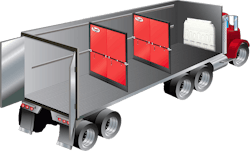FSA: Multi-temp trailers boost efficiency
Transportation best practices and technologies are critical for food companies aiming to leverage their supply chains to stay competitive. Efficient, reliable logistics not only ensure products arrive fresh and on-time, but also help to reduce operational costs, minimize waste, and support sustainability goals.
By leveraging technologies like route optimization, real-time tracking, and temperature-controlled shipping, companies can enhance service levels, meet consumer demands more effectively, and respond quickly to supply chain disruptions. In an industry where margins are tight and customer expectations are high, strong transportation strategies can be a key differentiator that drives long-term success.
But there’s an equipment technology advancement that is making a significant impact is the use of multi-temperature zone trailers—refrigerated trailers equipped to carry goods at different temperature settings simultaneously. These high-tech trailers are helping food companies optimize routes, reduce waste, and better meet customer expectations across the cold chain, according to a new blog post from the Food Shippers of America.
A smarter way to transport diverse products
From frozen meats to fresh produce and dairy products, food companies often need to ship goods that require drastically different storage temperatures. Traditionally, this meant using separate trucks or making multiple trips—an approach that is both time-consuming and costly.
Multi-temperature trailers, however, divide the cargo space into individually controlled compartments, allowing frozen, chilled, and ambient products to be transported together. This innovation reduces the need for multiple trucks and enables mixed-load deliveries on a single route.
The benefits are more than just logistical. By consolidating loads, food companies can cut down on fuel consumption and vehicle miles traveled, helping to reduce carbon emissions and operating costs. It also supports sustainability goals, a growing priority in the food industry as consumers and retailers demand greener supply chains.
Moreover, fewer trips mean lower labor costs, reduced vehicle wear and tear, and improved fleet utilization, allowing companies to do more with fewer assets.
In addition, maintaining the integrity of food products is critical. Multi-temp trailers allow for precise temperature control in each compartment, which helps reduce spoilage and ensures that products arrive at peak quality. This level of control is especially important when transporting perishable items over long distances or during fluctuating weather conditions.
By extending shelf life and reducing waste, companies not only save money but also align with broader efforts to combat food loss throughout the supply chain.
For example, Coastal Carriers is a transportation and logistics company that provides distribution, warehousing, and transportation services to the food industry. The Missouri-based company operates multi-temp trailers that are equipped to handle a variety of temperature requirements, ensuring products remain fresh and intact throughout the shipping process.

